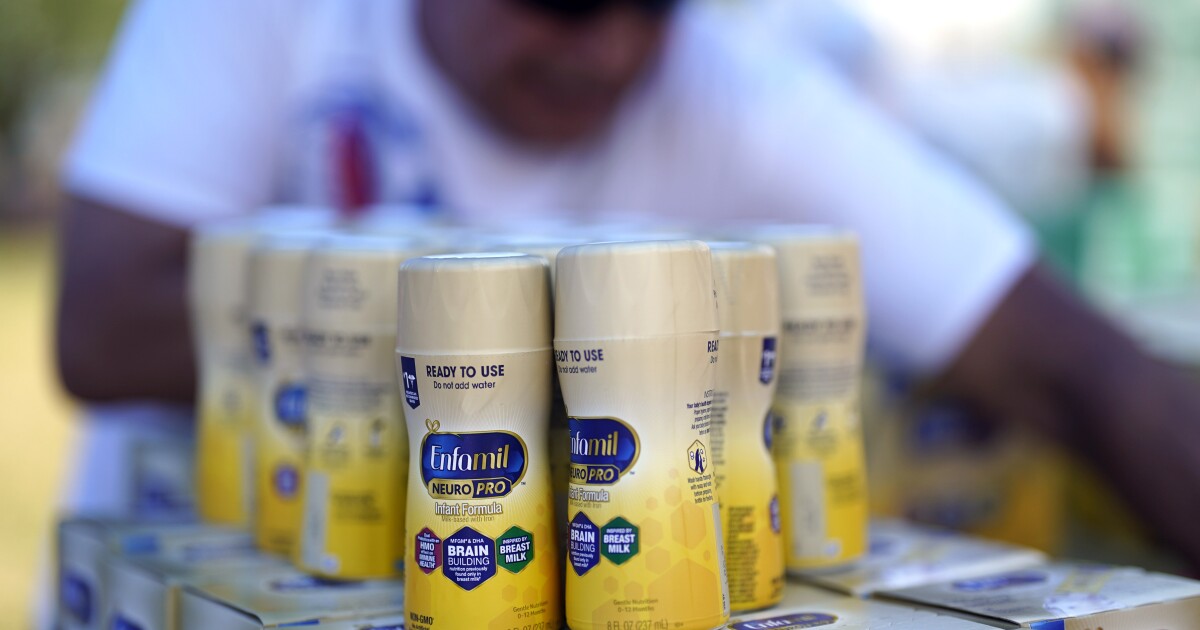FDA acknowledges slow response, ‘suboptimal’ decisions leading to baby formula shortage

WASHINGTON —
Sluggish response and questionable decisions by the Food and Drug Administration exacerbated the nation’s infant formula shortage, agency officials told lawmakers at a congressional hearing on Wednesday.
“You’re right to be concerned, and the public should be concerned,” said FDA Commissioner Robert Califf. The agency’s response “was too slow and there were decisions that were suboptimal along the way.”
Lawmakers grilled FDA officials during an hours-long hearing with the House Committee on Energy and Commerce, questioning what led to the formula shortage that is plaguing parents of infants across the nation.
Top executives from Abbott Nutrition, Gerber Products Co. and Reckitt — three of the largest manufacturers of infant formula in the U.S. — also testified before the committee, with Abbott Nutrition apologizing for its facility’s shortfalls.
Supplies of baby formula have been scarce for weeks. Abbott Nutrition issued a recall in February and closed its Michigan factory — the nation’s largest formula plant — after four babies who had consumed powdered formula from its plant fell ill. Two of the babies later died. Compounded by ongoing supply chain disruptions, the plant’s closure left few options on store shelves and increasing frustration as parents struggle to find nutrition for their children.
“We knew this would create supply problems but had no choice given the facility conditions,” Califf said. He said the agency issued warning memos about the supply chain risk to other government agencies, but did not alert President Biden or his chief of staff.
The problem brewed for months. Reports of an infection from Abbott’s Michigan facility emerged in September, and the FDA received a lengthy whistleblower complaint from a former employee regarding the building’s lack of sanitation a month later. It took two months for the FDA to interview the complainant, and many more months until the Abbott plant closed, according to Califf’s testimony.
Regulators said that they reached a deal to allow Abbott Nutrition to restart its factory — with production projected to be underway as soon as June 4 — following an overhaul in the company’s safety protocols and procedures. Abbott said it would take at least two months for its formula to begin arriving in stores.
“We are deeply, deeply sorry, and we are committed to ensuring this never happens again,” said Christopher Calamari, senior vice president of Abbott Nutrition. “By the end of June, we expect we will be supplying more formula to Americans than we were in January, before the recall.”
Lawmakers led a fiery interrogation into the Abbott facility’s deficiencies, calling on the company to acknowledge its major role in the crisis. Rep. Morgan Griffith (R-Va.) pushed Calamari to address his company’s “culture problem,” pointing to the whistleblower’s report and employees’ lack of care.
Calamari said his company would come out “better” from this situation.
Lawmakers also expressed criticism and disappointment concerning the FDA’s handling of the crisis, repeatedly asking what slowed the agency’s response and why government officials weren’t made aware of the problem sooner.
“The current formula shortage has real consequences. Babies and children are suffering. Parents are nervous wrecks,” said Rep. Diana DeGette (D-Colo.). “It was totally preventable. … We cannot ignore the need for longer-term solutions.”
“I’m actually pretty furious about the FDA and its lack of food safety, leadership, communication and action,” said Rep. Jan Schakowsky (D-Ill.). “I can’t tolerate, really, any more excuses and delays.”
Califf said that the FDA’s timeline was “too slow” and that there was “a lack of coordination,” but stressed that there was no “intentional delay.” He added that the FDA’s food programs require a revamp, including more funding, more personnel and newer technologies to track the nation’s supply chains.
The House last week passed a bill to provide $28 million in emergency funding to the FDA to address the formula shortage, which Califf said would be helpful. The bill’s prospects in the Senate are unclear.
Biden invoked the Defense Production Act to speed production of infant formula, and authorized flights to import supply from overseas.
Nearly 80,000 pounds of baby formula arrived in Indianapolis on Sunday, transported from Germany by military plane. The flight was the first of several to provide “some incremental relief in the coming days” as the government works on a more lasting response to the shortage, Brian Deese, director of the White House National Economic Council, said Sunday.
